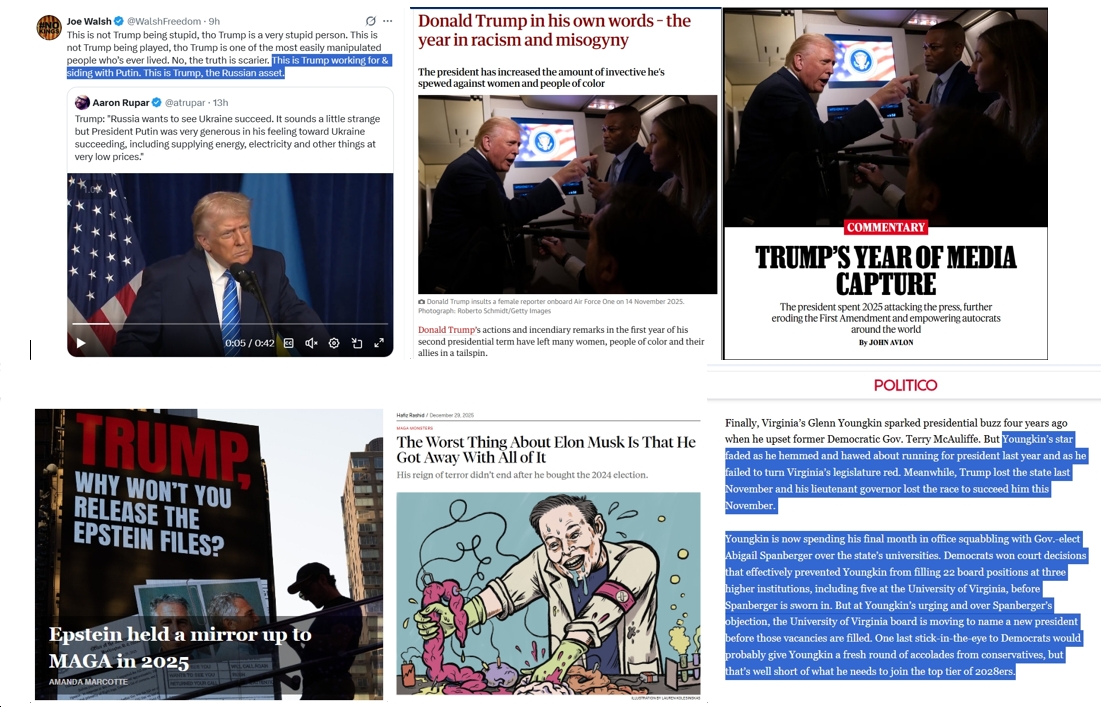This will be my next weekly op/ed in my congressional district (VA-06).
**************************
For me, the most memorable scene in the memorable 1972 film Cabaret takes place somewhere in the German countryside. The time is the mid-1930s.
We see various Germans of this rural area sitting at their tables outdoors next to some country inn, engaged in convivial conversations we don’t hear, enjoying good cheer with their friends and neighbors.
As the main characters are drinking their wine, a handsome German youth with a beautiful high tenor voice begins singing a song whose first lyrics are:
The sun on the meadow is summery warm.
The stag in the forest runs free.
The melody pierces the heart with its sweetness—at first.
At first we see only the youth’s handsome face. As he sings, the camera pulls back so we gradually see more. Suddenly, startlingly, we see he’s wearing a Nazi armband with its swastika. As the singing proceeds, the spirit of the song changes from the lyric sweetness of the opening into the aggressive drumbeat of a military anthem. The lone singer is joined by more and more of the crowd, whose faces have been transformed from the original warm friendliness into a look of angry resolve.
The singing ends with Nazi salutes.
The name of the song – and its repetitive line at the end of each stanza – is “Tomorrow Belongs to Me.”
The first time I saw this scene, when the film first came out, this depiction of a human transformation toward darkness gave me gooseflesh. What are we to make of people — whom one has seen as warm and friendly — being transformed right before our eyes into a menace that soon would inflict on the world one of its most unthinkable nightmares?
We are all human beings. Our lives are inextricably linked with our membership in our species. How are we to regard our kind—in particular after seeing people whom we can see as regular, decent people being transformed into willing agents of evil?
Lucky are those who never have to witness such dark transformations in their neighbors. But history has continued to compel many to see such disturbing things that cannot be un-seen.
I wonder how the Tutsis of Rwanda regard humankind now, in the wake of that terrible genocide their tribe suffered at the hands of the Hutu neighbors a quarter century ago. When people among whom one has lived for years turn into the mass murderers of their neighbors, what transformation does that bring about in the way the survivors view humankind?
Likewise with the Bosnian Muslims, whose Serbian neighbors created camps for raping Bosnian women, and murdered by the thousands people they’d lived with side-by-side for generations. I wonder how those Bosnians perceived humankind’s goodness and evil before that nightmare descended upon them, and what is their image of people now.
Thinking about such things in recent times, I recall two memories from earlier in my life:
Back in the early 1960s, in high school, I acted in the play The Diary of Anne Frank (I was Anne’s boyfriend). The last line of the play – taken from the young girl’s actual diary – is famous: “In spite of everything, I still believe that people are really good at heart.”
It’s a line that leaves the audience feeling uplifted—at least relatively so, considering that everyone also knows that, after writing this hopeful thought in her diary, this lovely person will be sent to her death in a concentration camp.
Much later, I had a friend who, as a Jewish boy, had survived the Holocaust. His life had been saved by a good Polish woman who had risked her life – and the lives of her family – by hiding him from the Nazis for two years in a small concealed room, with space for just a bed, until the Nazi power had been driven out.
This friend told me how he’d come to think of humanity:
“There are three kinds of people,” he said. “There are those who will do evil no matter what the state of the world around them. And there are those who will do good, no matter what. But both of those groups are small. The great majority of people belong to a third group: they will do good when that’s how the people around them are acting, and they’ll do evil when the winds of evil are blowing strongly around them.”
Upon reflection, I can see how my life’s work has been about how both Anne Frank and my Holocaust-survivor friend are right. My “Better Human Story” is about how we are born to wholeness but also how forces in our world – in ways frightening to witness — can turn people toward brokenness.



![Sunday News: “Trump Is Briefed on Options for Striking Iran as Protests Continue”; “Trump and Vance Are Fanning the Flames. Again”; “Shooting death of [Renee Good] matters to all of us”; “Fascism or freedom? The choice is yours”](https://bluevirginia.us/wp-content/uploads/2026/01/montage011126.jpg)

![Thursday News: “Europe draws red line on Greenland after a year of trying to pacify Trump”; “ICE Agent Kills Woman, DHS Tells Obvious, Insane Lies About It”; “Trump’s DOJ sued Virginia. Our attorney general surrendered”; “Political domino effect hits Alexandria as Sen. Ebbin [to resign] to join Spanberger administration”](https://bluevirginia.us/wp-content/uploads/2026/01/montage010826.jpg)












